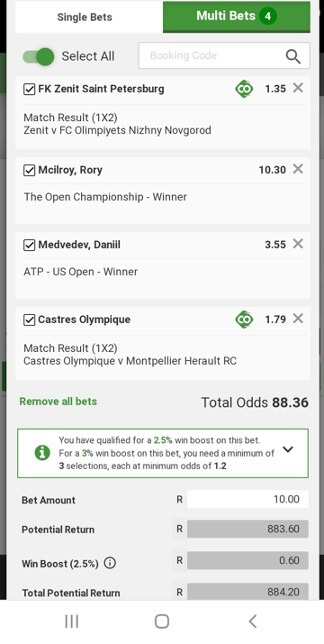It is crucial to understand the over/under meaning as it is a prevalent betting market. In addition to a few other betting terms, this guide will give you some examples and helpful betting tips.
What is the Meaning of Over/Under in Betting?
The over/under meaning is a sports betting type where the bookmaker sets a pre-agreed value. Players will bet whether the game will end with a total score either higher or lower than the threshold.
Most over/under events include two teams participating in a match with combined scores. If the player’s prediction is correct, they win the bet. Sometimes the number of goals or points may equal the set value, often referred to as a ‘push’. Wagers that match the threshold are refunded.

Types of Over/Under Betting
Here are the various bet types with their over/under meaning:
- Under 1.5 goals meaning requires only one goal to be scored at the end of the game. Therefore, the only winning scorelines must be either 0-0, 0-1, or 1-0.
- Under 2.5 goals meaning refers to betting on a game that results in less than three goals.
- Under 3.5 goals meaning is when you predict a game to end with less than 4 goals, and you win your bet. A game ending with 4 or more goals amounts to a loss.
- Under 4.5 goals meaning that you predict the total number of scores will be four or lower.
- Over 1.5 goals meaning is a market where you forecast if a game will have two or more goals scored. The bet loses if the game ends with 1 or no goals scored.
- Over 2.5 goals meaning requires the total number of goals scored is 3 or more. This market is most popular with football events.
- Over 3.5 goals meaning is where the match has to end with 4 or more goals scored. Remember that the bet is based only on regulation time, like 90 minutes for football.
- Over 4.5 goals meaning refers to predicting if a game will have 5 or more goals. This market is favoured when high-scoring teams with very prolific strikers compete against each other.
Over/Under Betting Examples
This market is most popular with football betting. We will use Manchester City vs Crystal Palace as an over/under betting example.
Manchester City is a high-scoring team and has won the most English Premier League titles in the past five seasons. On the other hand, Crystal Palace is a more average team with little influence in the competition. Sometimes this football club faces the threat of relegation only to survive with a few points.
In a match featuring these two teams, you expect Manchester City to score 4 or more goals. Crystal Palace will also try and get 2 goals. If you choose the over 4.5 goals and the above scoreline comes to pass, you will win the bet because the total number of goals in the game will be 6. However, a bettor who chooses the under 4.5 goals market will lose the bet.

Over/Under Betting Review
Now you understand the over/under meaning, let’s look at the pros and cons of this betting market.
Benefits of Over/Under Betting
The over/under market is flexible because you do not need to place a wager on an exact figure. If you predict that a game’s outcome will go above or below a particular threshold and succeeds, you win regardless of the scoreline. Check the team’s previous scoring history before you make your over/under prediction.
This market uses the total number of goals scored by both teams. No tension is associated where the player hopes one team will win. If you have chosen the over 3.5 goals option, you will support all teams to score many goals to surpass this threshold. But if you choose the under 1.5 goals market, you will not wish for either team to score a goal.
Another advantage of the over/under market is combining it with other bets. You can place a parlay bet in a basketball game for a particular team to win and still place a threshold under the over/under market for the same game. There are many other bets that you can link to this market to come up with brilliant combos.
Over/under meaning is put under one betting term, but it is essentially a variety of bets. In football, the lines include 1.5, 2.5, 3.5, 4.5, and more.
Drawbacks of Over/Under Betting
The first disadvantage of over/under meaning is that players automatically lose the bet once it fails the threshold, i.e. wagering on an under bet, but the game ends up being high-scoring. Games such as hockey and football have low lines, but they can quickly disappoint once there is a radical shift.
Furthermore, most bookmakers adjust prices for over bets to make them significantly lower than the under bet. This means for most operators, the over bet has no value.
- ✅ Flexible betting market
- ✅ Compatible with other bets
- ✅ Freedom to choose any line
- ❌ Radical shifts affect the bet
- ❌ Low value for over bets
Over/Under Meaning FAQ
If you have any outstanding inquiries about the over/under meaning in betting, then read our frequently asked questions below.
The meaning of over and under in betting is that punters can wager if the game’s goals will be above or below a set value.
The meaning of over and under in betting for basketball is punters wagering on the bookmaker’s combined number of points going above or below the set limit.
You calculate the over/under bets by combining the scores for both football teams.
In basketball, Team A’s average game scoring total is multiplied by Team B’s average game scoring total. The outcome is then divided by the league average.
The bet is cancelled, and the bookmaker refunds the stake to the player.
It is better to bet under because most bookmakers have reduced the prices of the over bet, making it lose value.
